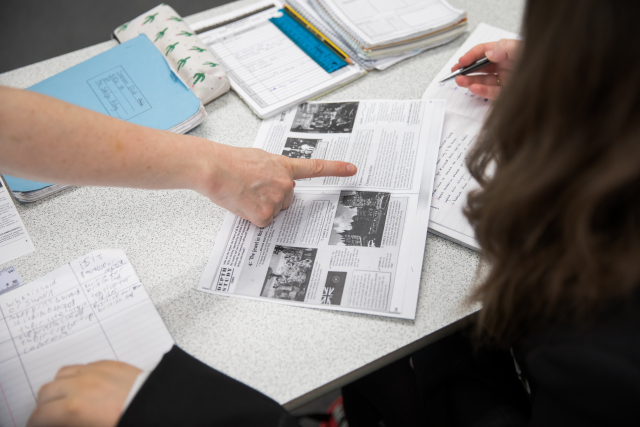On-demand webinar series: Meaningful and useable assessment in the secondary history classroom
HA webinar series for secondary history teachers and leaders

In recent years, many history teachers have done lots of exciting work to develop the curriculum they teach, incorporating new content, new scholarship and new enquiries. As part of this work, it is vital to uncover how far pupils are learning all that was intended, and the ways in which this is changing their understanding of the past.
In this series of six webinars, Jonathan Grande will explore and exemplify a wide range of types and forms of assessment that can be used to provide precise, accurate and meaningful insights into pupils’ historical knowledge and understanding. The sessions will consider the purposes of assessment in history, approaches to designing meaningful questions and tasks and what history teachers might do with the insights they gain. The series will mainly be focused on Key Stage 3, with relevance for Key Stages 4 and 5.
Learning outcomes
This webinar series will enable you to:
- Gain knowledge of key principles and purposes of effective and meaningful assessment in secondary history
- Gain knowledge of a wide range of different types of assessment, and how these can be used individually and collectively to reveal pupils’ knowledge and understanding in history
- Plan and design a wide range of assessment tasks that can reveal pupils’ substantive and disciplinary knowledge
- Understand the range of insights that can be made from assessments, and how these insights can be used to inform future planning and teaching
About the presenter
Jonathan Grande is an experienced Head of Department and the Network Lead for History across Ark Schools.
Programme
Session 1: Invisible assessment within an enquiry (FREE for HA members)
This session will explore the constant, routine assessment that goes on throughout the history lessons that make up a single enquiry – assessment that forms such a natural part of history teaching that it’s sometimes difficult to notice it as assessment. What is the purpose of this assessment? How can we use it to gain as much insight as possible into pupils’ learning? And what might we do with the insights we gain?
Session 2: Assessing the historical parts
This session will explore how history teachers can isolate and assess individual components, or parts, of pupils’ historical knowledge, but without reducing this to an assessment of isolated facts. The session will include examples of questions and tasks that can help teachers assess pupils’ understanding of a particular concept, their chronological knowledge and their knowledge of how historians they’ve studied have established evidence for their claims about the past.
Session 3: Assessing pupils’ answers to enquiry questions
This session will consider how history teachers can go about ‘marking’ pupils’ answers to enquiry questions in a way that values the pupils’ own voice and independent thinking, and avoids restricting them to a mark scheme. The session will also explore how we might use the process of answering an enquiry question as a teaching opportunity, without losing it as an opportunity for assessment.
Session 4: Assessing the historical whole
This session will set out a range of tasks and questions, beyond answering an enquiry question, that require pupils to draw on the knowledge they have built cumulatively throughout the curriculum. The session will consider the purposes of such assessment tasks and some underlying principles that will enable teachers to design their own.
Session 5: A year in assessment
This session will put forward a couple of examples of what meaningful and useable assessment could look like across a school year at Key Stage 3. The session will explore the range of assessment types in each example, the individual and collective purposes of the assessments, and the kinds of actions teachers might make at different points through the year. And all without there being a GCSE-style question in sight!
Session 6: A history teacher’s 'markbook'
This session will consider what it might be most useful for history teachers to keep a record of over the course of a year. Every time we read pupils’ work or listen to what they have to say about history, we learn more about their knowledge of, and relationship with, the past. But what might it be most useful for us to capture, and how might we do this most efficiently?
How to book
This webinar series took place in Summer 2024 and we have made access to the recordings available on demand from January 2025–January 2026.
Release date: Monday 6 January 2025
Expiry date: Tuesday 6 January 2026
You will need to be logged in to pay and access each webinar using the links on this page. We regret we are unable to arrange block purchases or issue invoices, but VAT receipts are available upon request. Once you have purchased each webinar, the recording will be available to view at the bottom of the relevant resource page until the stated expiry date.
Terms and conditions
All Historical Association webinars are subject to the HA CPD terms and conditions. For enquiries please contact events@history.org.uk.

